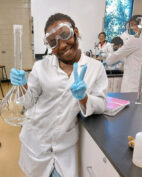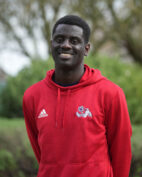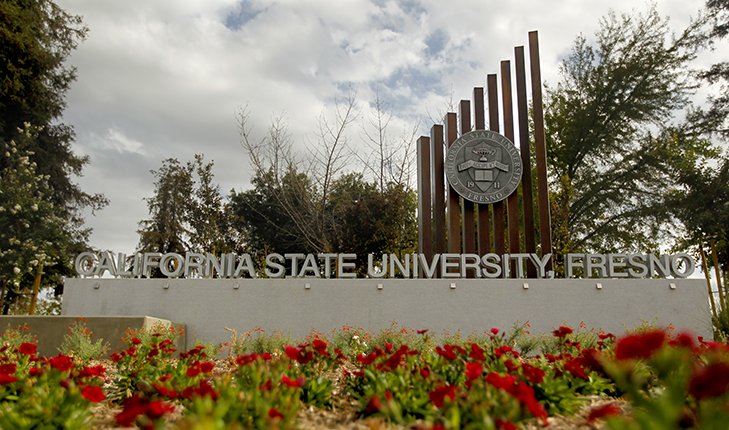Black and Indigenous sixth through ninth grade students from Madera Unified School District learned about science, technology, engineering and mathematics (STEM) fields during the inaugural George Washington Carver Black Excellence in Science and Technology Pre-Collegiate STEM Academy at Fresno State from July 17 through 21.
The academy was a partnership between the College of Science and Mathematics at Fresno State and Jewel of Justice, a professional consulting business in Fresno specializing in addressing racial equity and justice needs.
The 22 students participated in STEM-based learning activities related to neuroscience, psychology, chemistry, mathematics, computer science, nutrition and soil conservation. All were designed to emphasize active learning and to develop students’ science identities in and beyond the classroom. In addition, Fresno State students from the Black Excellence in Science and Technology Club provided leadership and guidance during the event.
 Eunice Odozie, a fourth year biochemistry major and member of the Science and Technology Club, worked with students on two experiments to show that science can be exciting inside and outside the lab. The experiments included extracting DNA from a strawberry and making ice cream using liquid nitrogen.
Eunice Odozie, a fourth year biochemistry major and member of the Science and Technology Club, worked with students on two experiments to show that science can be exciting inside and outside the lab. The experiments included extracting DNA from a strawberry and making ice cream using liquid nitrogen.
“It’s significant to have academies like this because it helps remove the stereotype that only specific groups of people can have these types of jobs,” Odozie said. “I hope the students, when they get to college and this stage of life, remember that there was someone at Fresno State who showed them that they belong in STEM.”
 Fellow club member and graduate student Dennis Ashong provided support and mentorship during the program as well. While helping the students with experiments, he talked to them about college life and answered some questions he had not previously considered, including what the most difficult DNA extraction entailed and how they could make nitrogen-infused ice cream at home by themselves.
Fellow club member and graduate student Dennis Ashong provided support and mentorship during the program as well. While helping the students with experiments, he talked to them about college life and answered some questions he had not previously considered, including what the most difficult DNA extraction entailed and how they could make nitrogen-infused ice cream at home by themselves.
Dr. Chris Miller, a Fresno State psychology professor, and other faculty have worked side-by-side with Jewel of Justice founder and Fresno State alumna Dr. Karen Crozier on the program. They have partnered over the years on the ‘George Washington Carver: Black Excellence in Science and Technology’ project to introduce underrepresented students to the STEM fields and to future careers in those industries.
“I think for a lot of these students, they may or may not have been able to spend much time on the Fresno State campus,” Miller said.“This adds an additional component to their experience where they’re starting to, hopefully, imagine themselves as scientists and also as college students. And so, they’re starting to see themselves in multiple roles and experiencing the magic of what it would be like to take this education and career path.”
The themes of racial and social justice are also intertwined into the program with Jewel of Justice providing conversations on race and professional development training for the College of Science and Mathematics faculty and students who serve in this academy.
“There’s a tremendous amount of talent and creativity that we are simply not developing and supporting as we should be on a variety of scales at the community, national and international level,” Miller said. “The major point of this program is to provide support to the students, but it’s also for us, learning about the needs and interests of the students and parents in the community. It’s important to understand that the learning in this academy is bidirectional.”
While on campus, the students also engaged in the EDGE Challenge Ropes Course, which has been on campus for 30 years, and is designed to foster leadership and build teamwork.
The project is named after George Washington Carver, one of the most prominent Black scientists of the early 20th century. Most known for his research into alternative crops to cotton and methods to prevent soil depletion, he is an example of a luminary role model for Black and Indigenous students of the Central Valley, Crozier said.
“We hope that the students see themselves in ways that they possibly have never seen themselves before,” Crozier said. “We hope that they will be able to understand themselves as scientists, students and professionals in the making. We want them to be affirmed about who they are, and to be connected to passions within the STEM field.”
(Written by Katie Xiong, University Marketing and Communications news assistant.)





